- Home
- Robert Jordan
The Fires of Heaven Page 40
The Fires of Heaven Read online
Page 40
She drew Mist over to Jeade’en and leaned to put a hand on his arm. “I am so sorry, Rand. There was no way you could have stopped this.”
“I know,” he told her. He had not even known there was a town here until Rhuarc mentioned it casually five days ago—his councils with the chiefs had all been on whether they could cover more ground in a day, and what Couladin would do when he cleared the Jangai—and by that time the Shaido had finished here and gone. He had done with cursing himself for a fool then.
“Well, just you remember it. It was not your fault.” She heeled Mist on, and began talking to Aviendha before she was out of earshot. “I am glad he is taking it so well. He has the habit of feeling guilty over things he cannot control.”
“Men always believe they are in control of everything around them,” Aviendha replied. “When they find out they are not, they think they have failed, instead of learning a simple truth women already know.”
Egwene giggled. “That is the simple truth. Once I saw those poor people, I thought we would find him heaving somewhere.”
“Is his stomach so tender? I . . .”
Their voices faded away as the mare ambled on. Rand pulled himself back upright in the saddle, flushing. Trying to eavesdrop on them; he was behaving like an idiot. That did not stop him frowning at their departing backs. He only took responsibility for what he was accountable for, if only to himself. Just for things he could do something about. And what he should have done something about. He did not like them talking about him. Behind his back, or under his nose. The Light only knew what they were saying.
Dismounting, he led Jeade’en in search of Asmodean, who seemed to have wandered off. After so many days in the saddle, it was good to walk. Various clusters of tents were springing up along the pass; the mountain slopes and cliffs made formidable barriers, but the Aiel still arranged themselves as if they could expect attack from them. He had tried walking with the Aiel, but half a day was enough to put him back on the horse. It was hard enough to keep up with them mounted; they could wear out horses when they pressed.
Mat was down, too, squatting with his reins in one hand and that black-hafted spear across his knees, peering at the gaping gates, studying the town and muttering to himself while Pips tried to nibble at a thornbush. Mat was studying, not just staring. Where had that remark about sentries come from? Mat said odd things at times now, since their first visit to Rhuidean. Rand wished that he were willing to talk about what had happened, but he still denied that anything had, despite the foxhead medallion, the spear, and that scar around his neck. Melindhra, the Shaido Maiden that Mat had taken up with, was off to one side, watching Mat, until Sulin came and chased her away on some errand. Rand wondered if Mat knew the Maidens were laying bets on whether Melindhra would give up the spear for him. And on whether she would teach him to sing, too, though they only laughed when Rand asked what that meant.
The sound of music drew him to Asmodean, seated by himself on a granite outcrop with his harp on his knee. The crimson banner’s staff had been twisted into the rocky soil, and the mule tethered to it. “You see, my Lord Dragon,” he said cheerfully, “your bannerman keeps loyally to his duties.” His voice and expression changed, and he said, “If you must have this thing, why not let Mat carry it, or Lan? Or Moiraine, for that matter? She would be glad to carry your banner, and clean your boots. Be careful of her. She is a devious woman. When a woman says she will obey you, of her own will, it is time to sleep lightly and watch your back.”
“You carry it because you were chosen, Master Jasin Natael.” Asmodean gave a start and looked around, though everyone else was too far away, and too busy, to be listening. None but they two would have understood, anyway. “What do you know about those ruins up near the snow line? They must come from the Age of Legends.”
Asmodean did not even glance up the mountain. “This world is very changed from the world I . . . went to sleep in.” He sounded weary, and he shivered slightly. “What I know of what lies where, I have learned since waking.” The mournful sounds of “The March of Death” rose from his harp. “That could be what is left of the city where I was born, for all I know. Shorelle was a port.”
The sun had maybe an hour before the Spine of the World hid it; this close to high mountains, night came early. “I am too tired for one of our discussions tonight.” That was what they called Asmodean’s lessons in public, even when no one was around. Added to practice sessions with Lan or Rhuarc, those lessons had left him little time for sleep since leaving Rhuidean. “You take to your tent when you’re ready, and I will see you in the morning. With the banner.” There was no one else to carry the bloody thing. Maybe he could find somebody in Cairhien.
As he was turning away, Asmodean plucked something discordant and said, “No burning nets woven around my tent tonight? Do you finally begin to trust me?”
Rand looked back over his shoulder. “I trust you like a brother. Until the day you betray me. You have a parole for what you’ve done, in return for your teaching, and a better bargain than you deserve, but the day you turn against me, I will tear it up and bury it with you.” Asmodean opened his mouth, but Rand forestalled him. “That is me talking, Natael. Rand al’Thor. Two Rivers folk don’t like people who try to stab them in the back.”
Irritably, he pulled at the dapple’s reins and went on before the other man could say anything. He was not sure whether Asmodean had any inkling that a dead man was trying to take him over, but he should not let himself give the man hints. Asmodean was sure enough already that his was a helpless cause; if he began to think that Rand was not in full control of his own mind, perhaps that he was going mad, the Forsaken would abandon him in a heartbeat, and there was too much Rand had to learn yet.
White-robed gai’shain were erecting his tent under Aviendha’s direction, well into the pass mouth, with that huge carved snake fearing above. The gai’shain had their own tents, but those would be the last erected, of course. Adelin and a dozen or so Maidens squatted nearby, watching, waiting to guard his sleep. Even with over a thousand Maidens encamped around him every night, they still put a guard on his tent.
Before approaching, he reached out through the angreal in his coat pocket to seize saidin. There was no need to actually touch the carving of the fat little man with a sword, of course. Mingled filth and sweetness filled him, that raging river of fire, that crushing avalanche of ice. Channeling as he had done every night since leaving Rhuidean, he set wards around the entire encampment, not only what was in the pass but every tent in the hills below as well, and on the slopes of the mountains. He needed the angreal to set wardings so large, but only just. He had thought that he was strong before, but Asmodean’s teachings were making him stronger. No human or animal crossing the line of that ward would notice anything, but Shadowspawn that touched it would sound a warning that everyone in the tents would hear. Had he done this in Rhuidean, the Darkhounds could never have entered without him knowing.
The Aiel themselves would have to keep watch for human enemies. Wardings were complex weaves, if tenuous, and trying to make them do more than one thing could render them useless, in practicality. He could have made this one to kill Shadowspawn instead of merely giving warning, but that would have been like a beacon to any male Forsaken who might be searching, and to Myrddraal, too. No need to bring his enemies down on him when they might not know where he was. This, even one of the Forsaken would not know until he was close, and a Myrddraal not until it was too late.
Letting go of saidin was an exercise in self-control, despite the foulness of the taint, despite the way the Power tried to scour him away like sand on a riverbed, to burn him, obliterate him. He floated in the vast emptiness of the Void, yet he could feel the air stirring against each hair on his head, see the weave of the gai’shain’s robes, smell Aviendha’s warm scent. He wanted more. But he could smell the ashes of Taien, too, smell the dead who had been burned, the corruption of those who had not, even the ones already buried, min
gled with the dry soil of their graves. That helped. For a while after saidin was gone, all he did was take deep breaths of hot, arid air; compared to before, the whiff of death seemed absent, and the air itself pure and wonderful.
“Look what was here before us,” Aviendha said as he let a meek-faced white-robed woman take Jeade’en. She held up a brown snake, dead, but as thick as his forearm and nearly three paces long. The bloodsnake took its name from the effect of its bite, turning the blood to jelly in minutes. Unless he missed his guess, the neat wound behind its head had come from her belt knife. Adelin and the other Maidens looked approving.
“Did you ever for one minute think that it could have bitten you?” he said. “Did you ever think of using the Power instead of a bloody belt knife? Why didn’t you kiss it first? You had to be close enough.”
She drew herself up, and her big green eyes should have brought on the night’s chill early. “The Wise Ones say it is not good to use the Power too often.” The clipped words were as cold as her eyes. “They say it is possible to draw too much and harm yourself.” Frowning slightly, she added, more to herself than him, “Though I have not come near what I can hold yet. I am sure of it.”
Shaking his head, he ducked into the tent. The woman would not listen to reason.
No sooner had he settled himself against a silk cushion near the still unlit fire than she followed him. Without the bloodsnake, thankfully, but gingerly carrying something long wrapped in thick layers of gray-striped blanket. “You were worried for me,” she said in a flat voice. There was no expression at all on her face.
“Of course not,” he lied. Fool woman. She’ll get herself killed yet because she doesn’t have the sense to be careful when it’s needed. “I’d have been as worried for anyone. I would not want anyone bitten by a bloodsnake.”
For a moment she eyed him doubtfully, then gave a quick nod. “Good. So long as you do not presume toward me.” Tossing the bundled blanket at his feet, she sat on her heels across the firepit from him. “You would not accept the buckle as canceling debt between us . . .”
“Aviendha, there is no debt.” He thought that she had forgotten about that. She went on as if he had not spoken.
“. . . but perhaps that will cancel it.”
Sighing, he unwrapped the striped blanket—warily, since she had held it far more uneasily than she had the snake; she had held the bloody snake as if it were a piece of cloth—unwrapped it, and gasped. What lay inside was a sword, the scabbard so encrusted with rubies and moonstones that it was hard to see the gold except where a rising sun of many rays had been inset. The ivory hilt, long enough for two hands, had another inlaid rising sun in gold; the pommel was thick with rubies and moonstones, and still more made a solid mass along the quillons. This had never been made to use, only to be seen. To be stared at.
“This must have cost . . . Aviendha, how could you pay for it?”
“It cost little,” she said, so defensively that she might as well have added that she lied.
“A sword. How did you ever come by a sword? How did any Aiel come by a sword? Don’t tell me Kadere had this hidden in his wagons.”
“I carried it in a blanket.” She sounded even more touchy now than she had about the price. “Even Bair said that would make it all right, so long as I did not actually touch it.” She shrugged uncomfortably, shifting and reshifting her shawl. “It was the treekiller’s sword. Laman’s. It was taken from his body as proof that he was dead, because his head could not be brought back so far. Since then it has passed from hand to hand, young men or fool Maidens who wanted to own the proof of his death. Only, each began to think of what it was, and soon sold it to another fool. The price has come down very far since it first was sold. No Aiel would lay hand to it even to remove the stones.”
“Well, it is very beautiful,” he said, as tactfully as he could manage. Only a buffoon would carry something this gaudy. And that ivory hilt would twist in a hand slippery with sweat or blood. “But I cannot let you . . .” He trailed off as he bared a few inches of the blade, out of habit, to examine the edge. Etched into the shining steel stood a heron, symbol of a blademaster. He had carried a sword marked like that once. Suddenly he was ready to bet that this blade was like it, like the raven-marked blade on Mat’s spear, metal made with Power that would never break and never need sharpening. Most blademasters’ swords were only copies of those. Lan could tell him for certain, but he was sure already in his own mind.
Pulling the scabbard off, he leaned across the firepit to place it in front of her. “I will take the blade to cancel the debt, Aviendha.” It was long and slightly curved, with a single edge. “Just the blade. You can have the hilt back, too.” He could have a new hilt and scabbard made in Cairhien. Maybe one of Taien’s survivors was a decent bladesmith.
She stared wide-eyed from the scabbard to him and back, mouth open, stunned for the first time that he had ever seen. “But those gems are worth much, much more than I—You are trying to put me in your debt again, Rand al’Thor.”
“Not so.” If this blade had lain untouched, and untarnished, in its scabbard for over twenty years, it had to be what he thought. “I did not accept the scabbard, so it has been yours all along.” Tossing one of the silk cushions into the air, he executed the seated version of the form called Low Wind Rising; feathers rained down as the blade sliced neatly through. “And I don’t accept the hilt, either, so that’s yours, too. If you have made a profit, it’s your own doing.”
Instead of looking happy at her good fortune—he suspected she had given everything that she had for the sword, and likely gotten back a hundred times as much or more in the scabbard alone—instead of seeming glad, or thanking him, she glared through the feathers as indignantly as any goodwife in the Two Rivers seeing her floor littered. Stiffly, she clapped, and one of the gai’shain appeared, immediately going to her knees to begin cleaning up the mess.
“It is my tent,” he said pointedly. Aviendha sniffed at him in perfect imitation of Egwene. Those two women were definitely spending too much time together.
Supper, when it came at full dark, consisted of the usual flat pale bread, and a spicy stew of dried peppers and beans with chunks of nearly white meat. He only grinned at her when he learned that it was the bloodsnake; he had eaten snake and worse since coming to the Waste. Gara—the poisonous lizard—was the worst in his estimation; not for the taste, which was rather like chicken, but because it was lizard. It sometimes seemed that there must be more poisonous things—snakes, lizards, spiders, plants—in the Waste than in the rest of the world combined.
Aviendha appeared disappointed that he did not spit the stew out in disgust, though sometimes it was difficult to tell what she was feeling. At times she seemed to take great pleasure in discomfiting him. Had he been trying to pretend that he was Aiel, he would have thought she was trying to prove he was not.
Tired and eager for sleep, he only took off his coat and boots before crawling into his blankets and turning his back to Aviendha. Aielmen and-women might take sweatbaths together, but a short time in Shienar, where they did something much the same, had convinced him that he was not made for that sort of thing, not without going so red in the face that he died of it. He tried not to listen to the rustle of her undressing beneath her own blankets. At least she had that much modesty, but he kept his back turned anyway, just in case.
She claimed she was supposed to sleep there to continue his lessons on Aiel ways and customs, since he spent so much of his days with the chiefs. They both knew that was a lie, though what the Wise Ones thought she could find out this way, he could not imagine. She gave little grunts every now and then as she tugged at something, and muttered to herself.
To cover the sounds, and stop himself thinking of what they must mean, he said, “Melaine’s wedding was impressive. Did Bael really know nothing about it until Melaine and Dorindha told him?”
“Of course not,” she replied scornfully, pausing for what he thought was a stoc
king coming off. “Why should he know before Melaine laid the bridal wreath at his feet and asked him?” Abruptly she laughed. “Melaine nearly drove herself and Dorindha to distraction finding segade blossoms for the wreath. Few grow so close to the Dragonwall.”
“Does that mean something special? Segade blossoms?” That was what he had sent her, the flowers she had never acknowledged.
“That she has a prickly nature and means to keep it.” Another pause, broken by mutters. “Had she used leaves or flowers from sweetroot, it would have meant she claimed a sweet nature. Morning drop would mean she would be submissive, and . . . There are too many to list. It would take me days to teach all the combinations to you, and you do not need to know them. You will not have an Aiel wife. You belong to Elayne.”
He nearly looked at her when she said “submissive.” A word less likely to describe any Aiel woman he could not conceive. Probably means she gives warning before she stabs you.
There had been more of a muffled sound to her voice at the end. Pulling her blouse over her head, he realized. He wished the lamps were out. No, that would have made it worse. But then, he had been through this every single night since Rhuidean, and every single night it was worse. He had to put an end to it. The woman was going to sleep with the Wise Ones, where she belonged, from now on; he would learn what he could from her as he could. He had thought exactly the same thing for fifteen nights now.
Trying to chase the pictures out of his head, he said, “That bit at the end. After the vows were said.” No sooner had half a dozen Wise Ones pronounced their blessings than a hundred of Melaine’s blood kin had rushed in to surround her, all carrying their spears. A hundred of Bael’s kin had rallied to him, and he had fought his way to her. No one had been veiled, of course—it was all part of custom—but blood had still been shed on both sides. “A few minutes before, Melaine was vowing that she loved him, but when he reached her, she fought like a cornered ridgecat.” If Dorindha had not punched her in the shortribs, he did not think Bael would ever have gotten her over his shoulder to carry off. “He still has the limp and the black eye she gave him.”

 Conan the Unconquered
Conan the Unconquered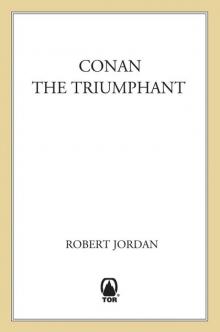 Conan the Triumphant
Conan the Triumphant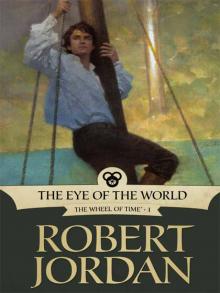 The Eye of the World
The Eye of the World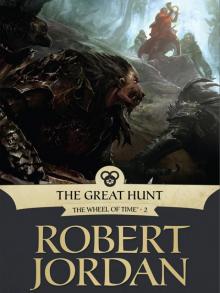 The Great Hunt
The Great Hunt Conan the Victorious
Conan the Victorious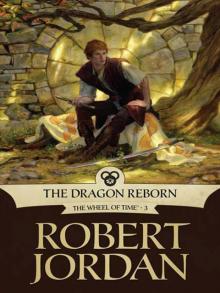 The Dragon Reborn
The Dragon Reborn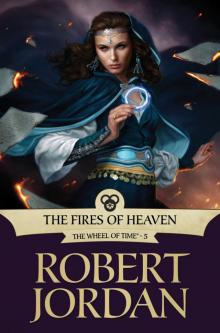 The Fires of Heaven
The Fires of Heaven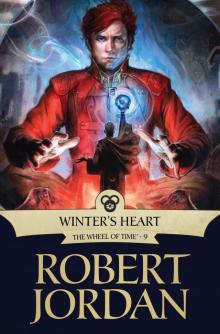 Winter's Heart
Winter's Heart Lord of Chaos
Lord of Chaos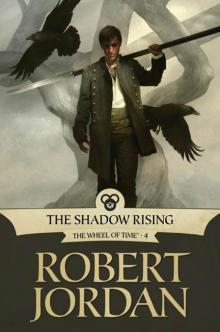 The Shadow Rising
The Shadow Rising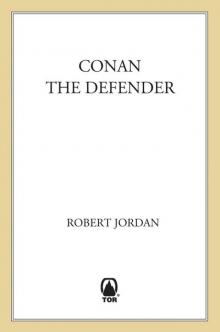 Conan the Defender
Conan the Defender The Strike at Shayol Ghul
The Strike at Shayol Ghul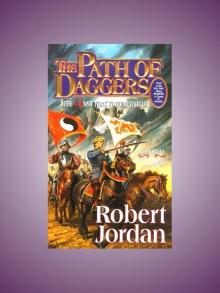 The Path of Daggers
The Path of Daggers A Memory of Light
A Memory of Light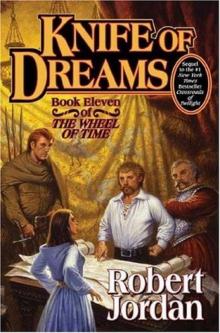 Knife of Dreams
Knife of Dreams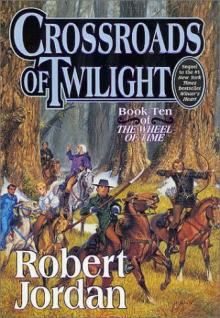 Crossroads of Twilight
Crossroads of Twilight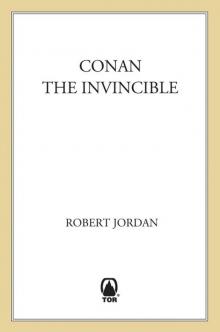 Conan the Invincible
Conan the Invincible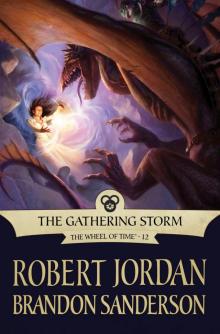 The Gathering Storm
The Gathering Storm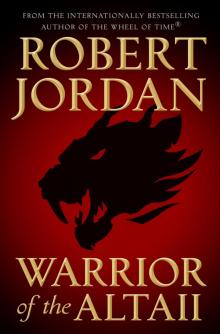 Warrior of the Altaii
Warrior of the Altaii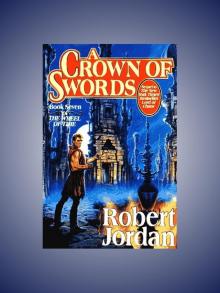 A Crown of Swords
A Crown of Swords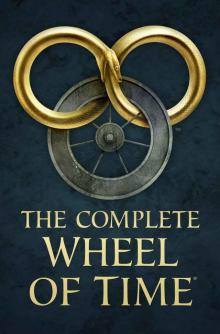 The Wheel of Time
The Wheel of Time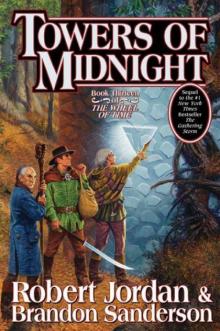 Towers of Midnight
Towers of Midnight Conan Chronicles 2
Conan Chronicles 2 Conan the Magnificent
Conan the Magnificent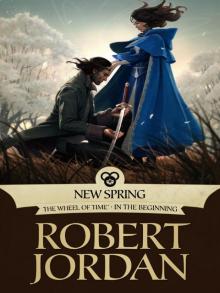 New Spring
New Spring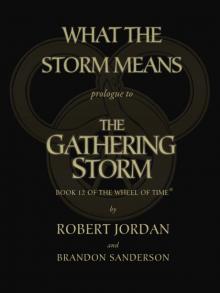 What the Storm Means
What the Storm Means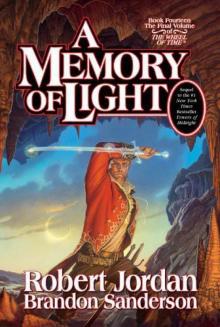 A Memory of Light twot-14
A Memory of Light twot-14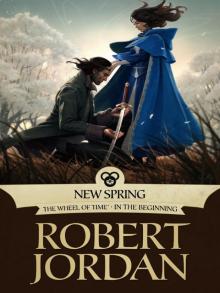 New Spring: The Novel
New Spring: The Novel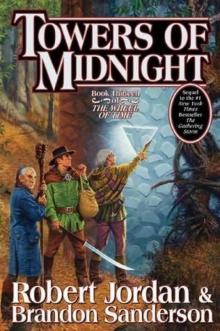 Towers of midnight wot-13
Towers of midnight wot-13 A Memory Of Light: Wheel of Time Book 14
A Memory Of Light: Wheel of Time Book 14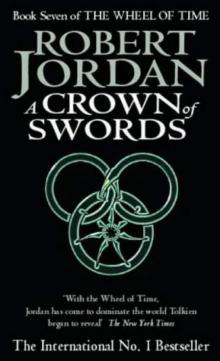 A Crown of Swords twot-7
A Crown of Swords twot-7 Lord of Chaos twot-6
Lord of Chaos twot-6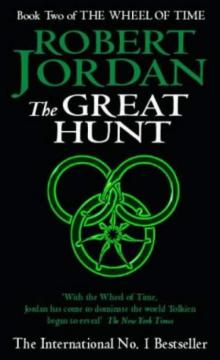 The Great Hunt twot-2
The Great Hunt twot-2 The Shadow Rising twot-4
The Shadow Rising twot-4![Wheel of Time-11] Knife of Dreams Read online](http://i1.bookreadfree.com/i1/04/03/wheel_of_time-11_knife_of_dreams_preview.jpg) Wheel of Time-11] Knife of Dreams
Wheel of Time-11] Knife of Dreams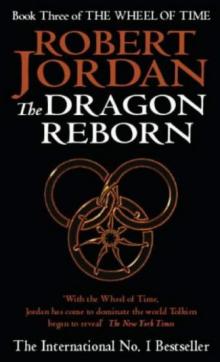 The Dragon Reborn twot-3
The Dragon Reborn twot-3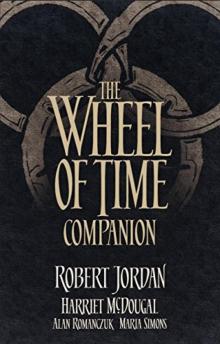 The Wheel of Time Companion
The Wheel of Time Companion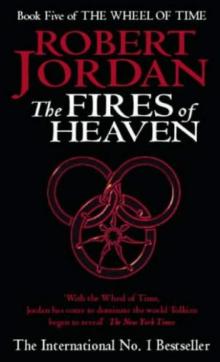 The Fires of Heaven twot-5
The Fires of Heaven twot-5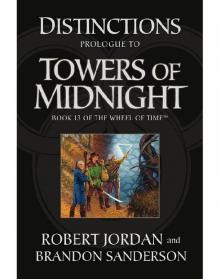 Prologue to Towers of Midnight
Prologue to Towers of Midnight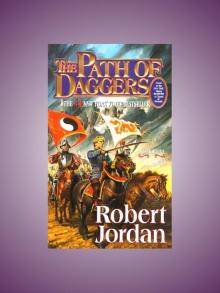 The Path of Daggers - The Wheel of Time Book 8
The Path of Daggers - The Wheel of Time Book 8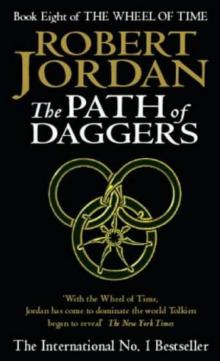 The Path of Daggers twot-8
The Path of Daggers twot-8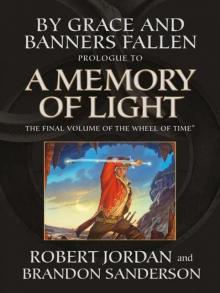 By Grace and Banners Fallen: Prologue to a Memory of Light
By Grace and Banners Fallen: Prologue to a Memory of Light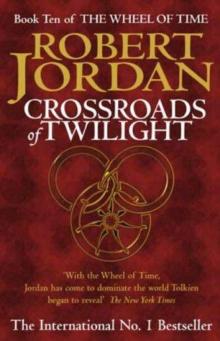 Crossroads of Twilight twot-10
Crossroads of Twilight twot-10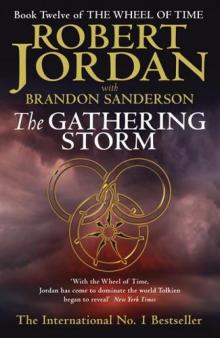 The Gathering Storm twot-12
The Gathering Storm twot-12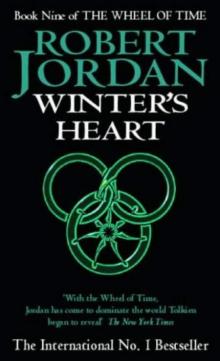 Winter's Heart twot-9
Winter's Heart twot-9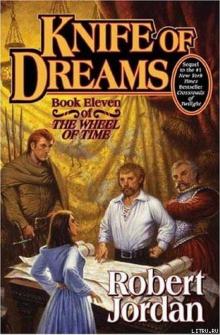 Knife of Dreams twot-11
Knife of Dreams twot-11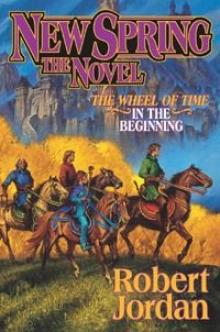 New Spring: The Novel (wheel of time)
New Spring: The Novel (wheel of time)